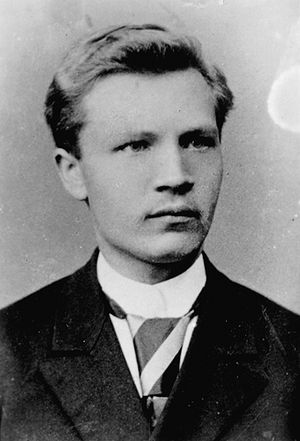Juhan Liiv facts for kids
Quick facts for kids
Juhan Liiv
|
|
|---|---|

Juhan Liiv as a young man
|
|
| Born | Johannes Liiv 30 April 1864 Allatzkiwwi, Governorate of Livonia, Russian Empire |
| Died | 1 December 1913 (aged 49) Werbach-Kosse, Governorate of Livonia, Russian Empire |
| Resting place | The grave of Juhan Liiv is located in Alatskivi cemetery, Tartu county |
| Pen name | §§ |
| Occupation | Prose writer, Poet |
| Language | Estonian language |
| Nationality | Estonian |
| Notable works | “Vari” published in 1894 |
| Parents | Benjamin Liiv, Marianna Liiv |
| Relatives | Jakob Liiv (brother) Elias Liiv (brother) Joosep Liiv (brother) |
Juhan Liiv (born April 30, 1864, died December 1, 1913) was a very famous Estonian poet and writer. He is known for his deep and thoughtful poems and short stories.
Contents
Early Life and Education
Juhan Liiv, whose birth name was Johannes, was born on April 30, 1864. His parents were Benjamin and Marianna Liiv. He grew up in Rupsi village, in a place called Oja farm, located in Alatskivi Parish.
His family was not rich and was very religious. Juhan was the youngest of five children. His older brother, Jakob Liiv, also became a poet. Even though they were poor, Juhan's parents knew that school was important. They spent what little money they had to send their children to school.
Juhan first went to Naelavere Village School. Then he attended Kodavere Parish School. After that, his parents sent him to study in Tartu in 1886. He went to the Hugo Treffner Gymnasium. However, he found it hard to fit in and left after only six months.
Juhan spent much of his childhood by himself. He was often isolated from other kids his age. This was partly because he had many illnesses when he was young. Because of his health, Juhan had to leave school and go back home. There, he started writing poems and articles for the Olevik newspaper. His early poems were very different from what other writers were doing, so many people did not notice them at first.
Famous Short Stories
Juhan Liiv became well-known in 1894. This was when his first short story, Vari (which means The Shadow), was published. This story was quite serious and a bit sad. It gave a hint of what his future writings would be like.
Many readers felt that Liiv was similar to the main character in Vari, named Villu. Villu was not physically strong, but he had a very strong mind. Liiv wrote several more short stories after Vari. However, none of them became as famous as Vari.
Health Challenges
Soon after his story Vari came out, Juhan Liiv needed to go to a special clinic in Tartu. He was dealing with a serious mental illness. Because of this illness, he sometimes believed unusual things. For example, he thought he was the son of Emperor Alexander II. He also sometimes believed he was the king of Poland or the famous Estonian poetess Lydia Koidula. He continued to struggle with his mental health for the rest of his life.
His Poetry
In 1909, another writer named Friedebert Tuglas met with Juhan Liiv. Later that year, a book was published that contained 495 of Liiv's poems.
Many of Liiv's poems have a serious or sad feeling. This was likely due to his health challenges, his family's poverty, and not having many close friendships. But some of his poems were less gloomy. These poems often described nature and showed his deep love for his home country.
Some of his well-known poems include:
- The Axe and the Forest
- Who Does Not Remember the Past (is Living Without the Future)
- To The Poets
- I Saw Estonia Yesterday
- Come Now, Night Darkness
- Cold
- Snowflake
His Final Days
In late 1913, Juhan Liiv was found on a train without a ticket. He could not afford one. He was asked to leave the train in a deserted area. He then had to walk home. By the time he arrived, he had been in very cold temperatures for two weeks. Sadly, he got a serious illness called pneumonia. He passed away on December 1, 1913.
The Juhan Liiv Prize for Poetry
The Juhan Liiv Prize for Poetry was started in 1965. The local government of Alatskivi gives out this award every year on April 30. The prize itself is a special leather shepherd's bag. A local artist makes each bag by hand.
Images for kids
See also
 In Spanish: Juhan Liiv para niños
In Spanish: Juhan Liiv para niños
 | James B. Knighten |
 | Azellia White |
 | Willa Brown |


